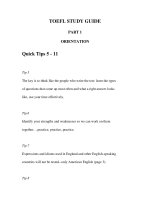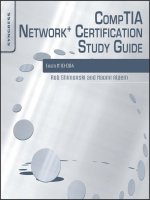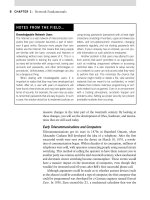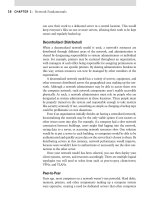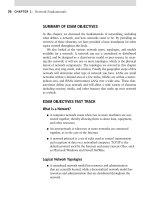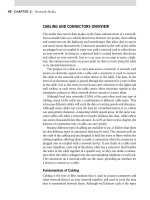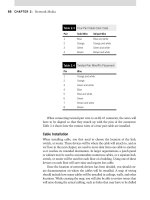Longman pronunciation dictionary study guide part 1 ppt
Bạn đang xem bản rút gọn của tài liệu. Xem và tải ngay bản đầy đủ của tài liệu tại đây (324.71 KB, 10 trang )
1
LONGMAN
PRONUNCIATION
DICTIONARY
STUDY GUIDE
Clare Fletcher
Longman
2
Longman Group UK Limited
Longman House, Burnt Mill, Harlow,
Essex CM20 2JE, England
and Associated Companies throughout the world.
© Longman Group UK Limited 1990
All rights reserved: no part of this publication may be reproduced, stored in a retrieval system, or
transmitted in any form or by any means, electronic, mechanical, photocopying, recording, or
otherwise, without the prior written consent of the Publishers.
ISBN 0 582 05386.2
Set in Monophoto Century Schoolbook
Printed in Great Britain
by Richard Clay PLC., Bungay, Suffolk.
3
CONTENTS
Introduction
Part A: Pronunciations and variants
1. Characters used in phonemic transcription ex.1-8
2. What pronunciations are given: the layout of entries ex.9-11
3. Alternative pronunciations
DIAGNOSTIC EXERCISE ex.12
ALTERNATIVES AT THE BEGINNING OF A WORD ex.13
ALTERNATIVES AT TH E END OF A WORD ex.14
ALTERNATIVES IN THE MIDDLE OF A WORD ex.15
COMBINATIONS OF ALTERNATIVES ex.16
ALTERNATIVE PRONUNCIATIONS INVOLVING THE SYMBOL ▪ ex.17
QUIZ ON ALTERNATIVE PRONUNCIATIONS ex.18
4. Inflected and derived words ex.19-20
APPLICATION EXERCISES ON LAYOUT OF ENTRIES.
ALTERNATIVE PRONUNCIATIONS. INFLECTIONS AND DERIVED FORMS ex.21-22
5. Optional sounds
SOUNDS SHOWN IN ITALICS: ELISION ex.23-26
SOUNDS SHOWN BY RAISED LETTERS: INSERTION ex.27
CONVERSATION FOR STUDY: OPTIONAL SOUNDS ex.28
6. Syllabic consonants ex.29-31
7. Compression
COMPRESSION INVOLVING A CONSONANT ex.32-35
COM PRESSION INVOLVING A VOWEL ex.36-37
CONVERSATION FOR STUDY: SYLLABIC CONSONANTS AND ex.38
COMPRESSION
Part B: Stress in words and phrases
8. Pairs of words with different stress ex.39-43
9. Stress marking
PRIMARY STRESS ex.44-45
SECONDARY AND PRIMARY STKKSS ex.46-47
TERTIARY STRESS ex.48-50
MIXED PATTERNS ex.51-53
10. Stress shift ex.54-58
11. Compounds and phrases ex.59-63
12. Alternative pronunciations with different stress ex.64-66
13. Suffixes ex.67-69
Part C: Aspects of pronunciation in the dictionary
14. American pronunciation
SIX DIFFERENCES BETWEEN BRITISH AND AMERICAN ENGLISH ex.70-75
QUIZZES ON AMERICAN PRONUNCIATION ex.76-77
TEXT FOR STUDY: AMERICAN PRONUNCIATION ex.78
15. Homophones ex.79
16. Abbreviations ex.80
17. Names of people and places ex.81
18. Assimilation ex.82-83
TEXT FOR STUDY: ASSIMILATION ex.84
19. Pronunciations derived by rule ex.85
20. Incorrect pronunciations ex.86
21. Combining forms ex.87-88
Key to Exercises
4
INTRODUCTION
This study guide enables readers to make the best use of the Longman Pronunciation Dictionary.
The dictionary and study guide together are a powerful aid to the study of English pronunciation.
WHAT THE STUDY GUIDE CONTAINS
• Discussion of features of English pronunciation shown in the dictionary and explanation of the
conventions used to show them.
• Exercises to develop effective use of the dictionary.
• Cross-references to relevant material in the dictionary's introduction and notes.
• Diagnostic exercises in the early sections to enable you to assess your proficiency and select
appropriate material.
• Explicit statements of aims to show the purpose of each exercise.
• A key at the back of the book for checking the answers to exercises, where these are not
immediately obvious from the dictionary.
The cassette provides three types of material:
• Illustration of pronunciations you see in the book and dictionary.
• Exercises.
• A means of checking your answers to certain exercises.
HOW TO USE THE STUDY GUIDE
You can work through the guide from beginning to end, or you can plan your own programme to
meet your needs.
Planning a programme
• Look at the Contents List.
• Use the diagnostic exercises in the early sections.
• Look at the aims of sections and of specific exercises.
• Select the sections and exercises which are useful for you.
Using the commentary and exercises
• It is always helpful to say the pronunciations you are reading, to make them clear and to fix
them in your memory. This may not be possible, for example if you are working in a library. But
if you are working by yourself, or with others also using the study guide, make a habit of saying
the pronunciations.
• Always look up pronunciations in the dictionary when you are told to do so. In some exercises,
the words to look up begin with the same letter, to speed up the search.
• Some exercises involve transcription; you can get further practice by transcribing any of the
dialogues and texts in the book and cassette, and these are transcribed in the key at the back of
the book.
• Look up cross-references to the introduction or notes in the dictionary, if you want to take a
point further.
5
RP Gen Consonants RP Gen Vowels
Am Am
• •
p
pen, copy, happen • •
ɪ
kit, bid, hymn
• •
b
back, bubble, job • •
e
dress, bed
• •
t
tea, tight, button • •
æ
trap, bad
•
t̼
cit
y, better •
ɒ
lot, odd, wash
• •
d
day, ladder, odd • •
ʌ
strut, bud, love
• •
k
key, cock, school • •
ʊ
foot, good, put
• •
g
get, giggle, ghost • •
iː
fleece, sea, machine
• •
ʧ
church, match, nature • •
eɪ
face, day, steak
• •
ʤ
judge, age, soldier • •
aɪ
price, high, try
• •
f
fat, coffee, rough, physics • •
ɔɪ
choice, boy
• •
v
view, heavy, move • •
uː
goose, two, blue
• •
θ
thing, author, path •
əʊ
goat, show, no
• •
ð
this, other, smooth
•
oʊ
goat, show, no
• •
s
soon, cease, sister •
ɒʊ
variant in cold
• •
z
zero, zone, roses, buzz • •
aʊ
mouth, now
• •
ʃ
ship, sure, station •
ɪə
near, here, serious
• •
ʒ
pleasure, vision •
eə
square, fair, various
• •
h
hot, whole, behind • •
ɑː
start, father
• •
m
more, hammer, sum
•
ɑː
lot, odd
• •
n
nice, know, funny, sun
•
ɒː
thought, law
• •
ŋ
ring, long, thanks, sung •
ɔː
thought, law
• •
l
light, valley, feel • •
ɔː
north, war
• •
r
right, sorry, arrange
•
oː
variant in force, four
• •
j
yet, use, beauty •
ʊə
cure, poor, jury
• •
w
wet, one, when, queen •
ɜː
nurse, stir
In foreign words only:
•
ɝː
nur
se, stir, courage
• •
x
loch, chutzpah • •
i
happy, radiation, glorious
•
ɬ
Llanelli, Hluhluwe • •
ə
about, comma, common
• •
u
influence, situation,
annu
al
• •
ɩ
intend, basic
•
ʊ
stimulus, educate
In foreign words only:
•
ɒ̃
grand prix, chanson
• •
ɑ̃ː
grand prix, chanson
•
ɒ̃ː
chanson
• •
æ̃
vingt-et-un
•
ɜ̃ː
vingt-et-un
6
Part A: pronunciation and variants
1 Characters used in phonemic transcription
The chart on the previous page shows the chit rafters which are used to transcribe
pronunciations in the dictionary. The sounds and key words are recorded on the cassette, followed
by the vowel sounds in sequence.
Within words, syllable boundaries are shown by spaces
e.g. ˌɪn dɪ ˈpend ənt
EXERCISE 1
Diagnostic exercise in reading straightforward phonemic transcriptions quickly and
accurately.
Time yourself as you do this exercise.
For each of the words a-j below, find the correct phonemic transcription in the list on the right. Write
its number next to the word. The first one is done for you.
a. await .5.
1. krɪ ˈeɪt ɔ
2. jet
b. billow
3. ˈɒ rɪnʤ
4. ʧəʊz
starting time:
c. chose
5. ə ˈweɪt
6. ʤet
finishing time:
d. creature
7. bɪ ˈləʊ
8. ˈsɜːʤ ən
time taken:
e. drudge
9. ə ˈreɪnʤ
10. hɑːt
f. hurt
11. drʌg
12. ˈbɪl əʊ
g. jet
13. rekt
14. ˈæv ɪd
h. orange
15. ʧɔɪz
16. ˈsɑːʤ ənt
i. sergeant
17. ˈkriːʧ ə
18. drʌʤ
j. wrecked
19. ˈreʧ ɪd
20. hɜːt
Check your answers to exercise 1 with the key at the back of the book.
7
EXERCISES 2-8
AIM: To practise recognising and producing straightforward phonemic transcriptions.
EXERCISE 2
Look back at the transcriptions in exercise 1. Write the words represented by the ten
transcriptions which did not match a-j.
EXERCISE 3
Which word does each of the transcriptions below represent? Circle the correct word. Work as
quickly as you can. The first one is done for you.
A B
1. aɪs
eyes ice
2. ˈæŋkəl
ankle uncle
3. səʊl
soil soul
4. briːð
breathe breath
5. əˈvɪɔd
avoid evade
6. θɪŋ
thin thing
7. ˈpəʊz ɪz
possess poses
8. vaɪn
vein vine
9. ˈluːv ə
louvre lover
10. ˈfiːl ɪŋz
fillings feelings
You can check your answers in the key and on the cassette.
EXERCISE 4
Look back at the pairs of words given in exercise 3. For each pair, transcribe the one not
transcribed on the left.
EXERCISE 5
Read the transcriptions below, and then listen to the eight words on the cassette. For each
word, write the letter of the correct transcription beside the corresponding number. The first one is
done for you.
a. ˈleð ə e. ˈkæʧ ə i. liːd ə m. ˈkɒŋ kɔːd
b. ˈwɒʃ ɪŋ f. luːs j. eɪʤ n. əˈlaɪv
c. kæ ˈʃɪə g. ˈwɒʧ ɪŋ k. ˈɒl ɪv o. luːz
d. ˈleʒ ə h. eʤ l. ˈkɒŋ kəd p.
ˈleʤ ə
1. .i. 2. 3. 4. 5. 6. 7. 8.
EXERCISE 6
Look back at transcriptions a-p in exercise 5. Write the eight words shown which were not
given on the cassette.
You can check your answers in the key and on the cassette.
EXERCISE 7
In the following pairs of words, is the first syllable the same (S) or different (D)? Use the
dictionary to check. The first two are done for you.
1. worthy worried .D. 7. majestic magician
2. feral ferrous .S. 8. patient patio
3. dynasty dynamite 9. southeast southern
4. variegated various 10. period pierrot
5. vagary vagabond 11. nutrient nutmeg
6. vicissitude vicar 12. foreign forecast
EXERCISE 8
8
Time yourself as you do this exercise.
For each of the words a-j below, find the correct phonemic transcription in the list on the right. Write
its letter next to the word. The first one is done for you.
a. season .19.
1. ˈsɪŋ ə
2. fɔ ˈnet ɪk
b. wordy
3. ə ˈgen
4. ˈfɔː mən
starting time:
c. foreman
5. ˈnʌt ə
6. ʃiːld
finishing time:
d. neuter
7. jɪə
8. fɔ ˈnæt ɪk
time taken:
e. phonetic
9. ˈsɪn ə
10. ˈpleʒ ə
f. sinner
11. ˈnjuːt ə
12. ˈwɜːd i
g. shield
13. ˈsiːz ɪŋ
14. ʤɪə
h. organ
15. pliːz
16. siːld
i. please
17. ˈɔːg ən
18. ˈfɔː neɪm
j. jeer
19. ˈsiːz ən
20. ˈwɜːð i
Check your answers with the key. Did you do better than in exercise 1? Were you more
accurate and/or quicker?
2 What pronunciations are given: the layout of entries
For every word the dictionary gives a main pronunciation. This is highlighted in blue. If the American
pronunciation is different, it is given, following the symbol ǁ, and aiso highlighted in blue. If no
separate American pronunciation is given, this means that the word has the same pronunciation in
British and American English.
match mæʧ dot, Dot dɒt ‖ dɑːt
If there are widely used alternatives, either in British or American English, these are given. Some
alternatives are characteristic of British regional accents, and are marked †.
data 'deɪt ə 'dɑːt ə, †'dæt ə ‖ 'deɪt̼ ə 'dæt̼ ə, 'dɑːt ə
bath v bɑːθ †bæθ
Occasionally, pronunciations are shown which many English speakers use, but which many other
English speakers consider incorrect. These are marked ◬.
ate past of eat et eɪt ‖ eɪt ◬et
(In American English et is considered incorrect.)
The dictionary entries below are labelled to show the pronunciations given.
9
EXERCISE 9
AIM: To become familiar with the layout of entries, and recognise the types of
pronunciation shown.
Label the dictionary entries below, like those on page 5.
EXERCISE 10
AIM: To recognise the types of pronunciation given, and practise transcribing them.
Study the dictionary entries printed below.
Then use the information to complete the boxes on the following page.
10
Main pron
1. match
2. ballad
3. mead
mæʧ
Main pron Alternative pron
4. lewd
5. suit
luːd ljuːd
Main pron AmE pron
6. mark
7. dot
8. herb
9. part
mɑːk mɑːrk
Main pron Regional pron AmE pron
10.bath
11.past
bɑːθ bæθ bæθ
Main pron AmE pron Alternative AmE pron
12.mayor
13.broad
14.ballet
15.bare
meə meɪər meər
Main pron Regional pron AmE pron Alternative AmE pron
16.new
17.tube
njuː nuː nuː njuː


